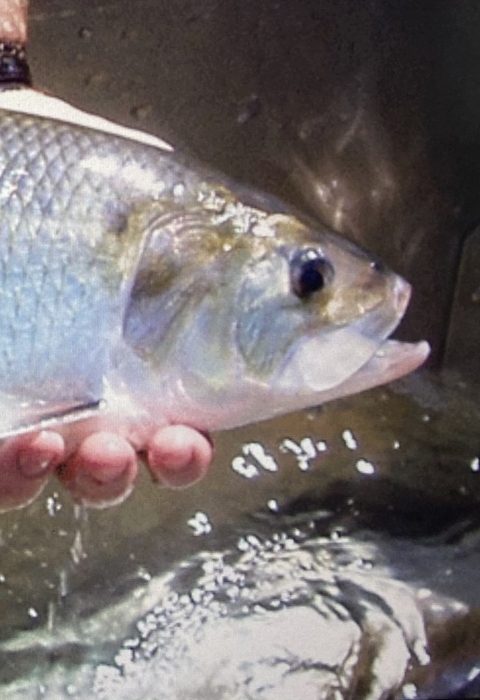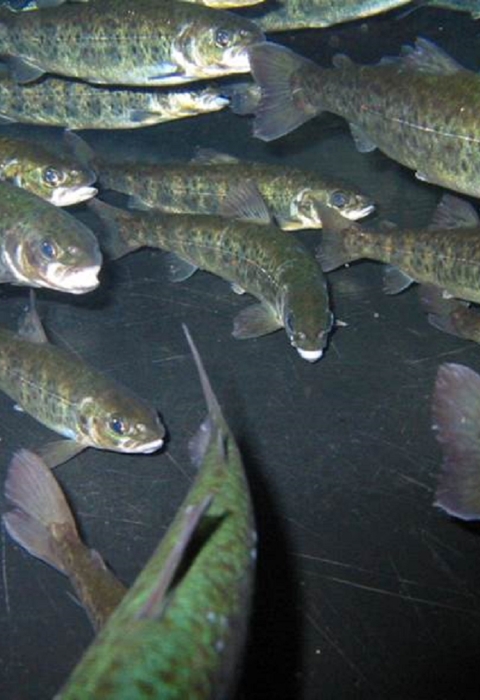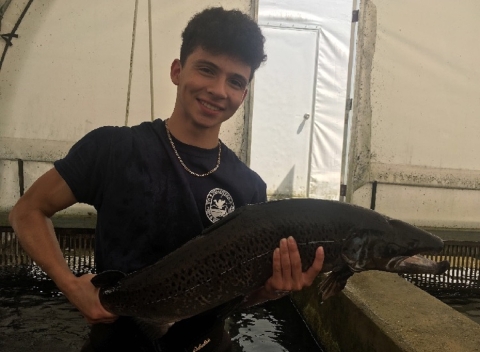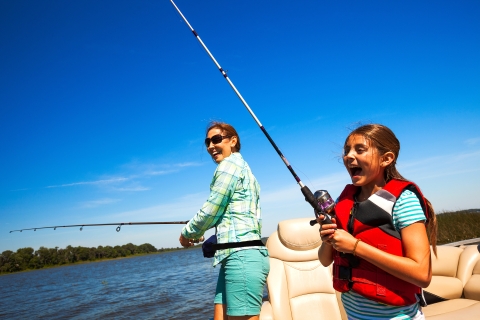Ways to Get Involved
We would love to partner with you on restoring habitat and species, or conducting outreach with youth and the public on the environment. Please contact us to see what opportunities are available. We currently work with several local groups on community pollinator gardens, removing invasive species invasive species
An invasive species is any plant or animal that has spread or been introduced into a new area where they are, or could, cause harm to the environment, economy, or human, animal, or plant health. Their unwelcome presence can destroy ecosystems and cost millions of dollars.
Learn more about invasive species projects, and conducting public outreach on the environment and the Connecticut River basin. Whether you want to further conservation, learn more about nature or share your love of the outdoors, you’ve come to the right place. We partner with volunteers, youth groups/students, landowners, neighbors and residents of both urban and rural communities to make a lasting difference. There are opportunities for everyone to get involved!
Volunteers: Gain new experiences and meet new people while helping to advance fish and aquatic conservation. If you’re just interested in assisting with some of the work we do, we have both office and field opportunities for you.
Local Groups: We have a variety of partnerships with local groups on projects ranging from local pollinator plantings to educational presentations.
Youth: Whether you’re a high school or college student seeking internship hours for school credit or just looking for more experience in this field, we have opportunities for you to learn more about this career.
Volunteering
Discover for yourself what tens of thousands of volunteers have learned: Volunteering for the U.S. Fish and Wildlife Service is fun and rewarding in many ways. Master new skills. Meet new friends. Enjoy a sense of accomplishment from doing your part to further wildlife conservation for the pleasure of generations to follow. Check out our station's latest volunteer opportunities on volunteer.gov or call (413) 548-9138.. We can accommodate a few volunteers per season, whether they are official internships for school credit or just looking for the experience.
Our Partners
Partnerships foster creative solutions to challenging situations and often the results are greater than the sum of the parts. Learn more about our local partners:
Since 1967, our office has worked with local environmental groups, private industry, and state and federal agencies to restore migratory fish in the Connecticut River basin. This collaboration continues and is focused on the long-term health of the Connecticut River.
The Atlantic States Marine Fisheries Commission (ASFMC) has served the Atlantic coastal states, coordinating the conservation and management of Atlantic coastal fisheries or over 70 years. The Commission was formed in 1942 by 15 member states, which recognized that far more could be accomplished through cooperation than through individual efforts. The goal is to leave healthy and abundant marine fisheries for the next generation to enjoy. The Connecticut River Fish and Wildlife Conservation Office serves on the Technical Committee helping to advise the Commission on managing healthy populations of American shad, alewife and blueback herring.
Outreach
Why is outreach and education important?
Research shows us that outreach and environmental education has a host of benefits for children, schools, and our families. Just a few of these include: enhancing creativity, imagination and critical thinking skills; helping students make connections between the classroom and the real world; and developing an appreciation and respect for the environment while promoting healthy lifestyles and strengthening communities.
Fish Migration Station (*link coming soon)
Some of our partners:
Trout Unlimited Trout in the Classroom
The Northern Forest Canoe Trail
Boating on the Connecticut River in Vermont and New Hampshire
Fishing Rules and Regulations
License Information
Fishing in the Connecticut River basin is regulated by four State agencies. You can find information on buying your fishing license and on the specific the laws and regulations of each state by visiting their Web sites:
Where Is Fishing for Atlantic Salmon Legal?
In CT, MA, NH and VT, it is illegal to fish for Atlantic salmon in the Connecticut River or its tributaries, outside of those select areas managed for landlocked Atlantic salmon – consult with local State agency regulations. If you catch a sea-run Atlantic salmon, you must release it immediately.
The State of Connecticut stocks hatchery-reared adult Atlantic salmon into the Naugatuck and Shetucket Rivers for fishing.
Fishing for Shortnose Sturgeon Is Illegal. This is an endangered species.
Where to See Fish in the Connecticut River Basin
Rainbow Dam in Windsor, Connecticut
- Fish ladder and visitor viewing area.
- Open during the spring migration, early May through late June, dawn to dusk.
- Call (860) 447-4316 for hours of operation.
Robert E. Barrett Fishway, Holyoke Dam, Holyoke Gas and Electric
- Call to confirm public viewing hours of operation, (413) 536-9474
Turners Falls Fish Ladder, First Light Power Resources Services, LLC
- Viewing Windows and Interpreters
- Open during the spring migration, generally mid May through mid June, Wednesday through Sunday, 9:00 am – 5:00 pm
- Call for hours and information, 1-800-859-2960, (413) 659-3714
Vernon Dam Fish Ladder, Vermont
- Viewing gallery
- Open during the spring migration, mid May through late June. Hours vary.
- The Visitor Center closes at 3:00 p.m when not counting fish.
Bellows Falls Fish Ladder and Visitor Center
- Friday and Saturday 10:00AM - 4:00PM (Memorial Day weekend through Labor Day weekend)
- Drop-in free environmental education programs on most Fridays and Saturdays from 10:00AM - 11:00AM. Programs are a geared towards children and families, but all are welcome!
- Contact: During open hours: (802) 460-4664;
During closed hours/dates: (802) 843-2111
Email: info@nature-museum.org



